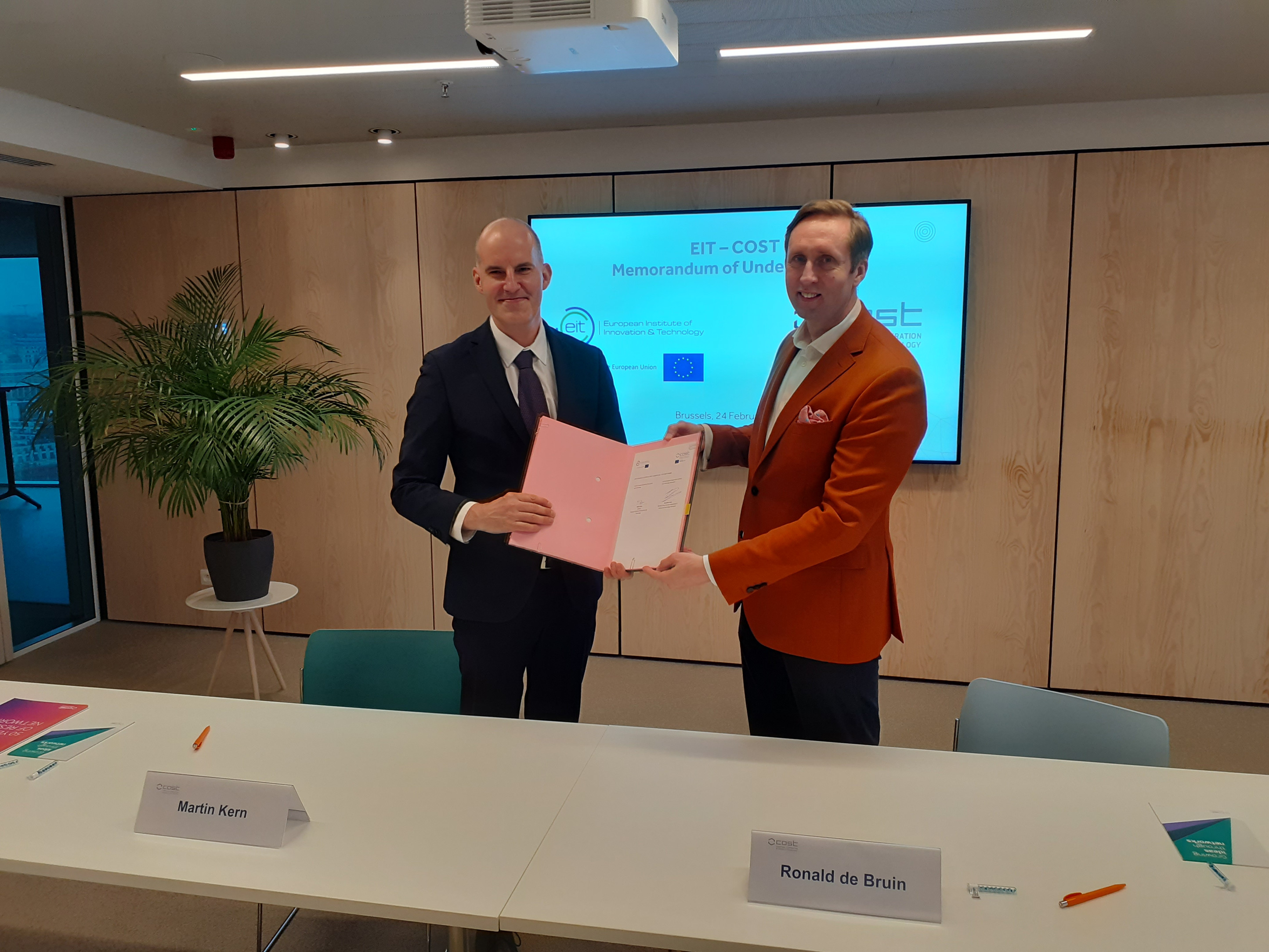EIT & COST: Connecting the innovation chain by reinforcing synergies

The European Institute of Innovation and Technology (EIT) and the European Cooperation in Science and Technology (COST) are teaming up to boost cooperation between scientists, businesses and innovators.
Ronald de Bruin, COST Association Director, and Martin Kern, EIT Director signed a new cooperation agreement to foster and strengthen collaboration within the EIT and COST communities. In the spirit of building a new European Research Area, the partnership between the EIT and COST will enable research institutions, businesses, and citizens to further develop their innovations and explore new market opportunities.
By signing the Memorandum of Understanding, COST and the EIT have agreed to cooperate on identifying synergies and complimentary activities, for example in strengthening innovation in the Western Balkans. This will help to deliver stronger impact, sustainable economic growth, better jobs and livelihoods, and better returns on public investments.
“Our aim as Europe’s largest innovation ecosystem of almost 3000 partners from business, education and research is to deliver innovations to solve global challenges. Our cooperation with COST will allow us to work in a complimentary way on shared priorities, for example to build innovation capacity in the Western Balkan countries. By working as partners, new opportunities will open up for our researchers and innovators.” - Martin Kern, EIT Director
“It is a great moment when the longest standing and one of the youngest European RTDI funding organisations joining forces to further connect the innovation chain. Our intention is to fully explore synergies by providing networking opportunities and follow-up funding opportunities for researchers and innovators. The cooperation with the EIT will further reinforce the new European Research Area and will strengthen Europe’s capacity to address scientific, technological and societal challenges.” - Ronald de Bruin COST Director.
As a first step, the EIT Jumpstarter programme has been identified as an area for collaboration with COST initiatives. This EIT Innovation Community pre-accelerator programme supports early innovators from Central-Eastern and Southern-European countries. COST and the EIT are convinced that Research and Innovation are the key drivers for sustainable growth and competitiveness. Better integration of the knowledge triangle and advancing the innovation performance of more countries and their regions across Europe, are preconditions for enhancing Europe’s performance in global competition and ensuring a sustainable future for all. The synergies between both organisations aim to create complementary activities with huge potential to build upon each other’s impact.
Background
The European Cooperation in Science and Technology (COST) networks are effectively bridging the innovation divide and participation gaps in Europe and providing a large spectrum of opportunities for young generations of researchers and innovators. Interdisciplinary research often results in discoveries, innovations and breakthroughs that are crucial in the ambition to boost jobs, economic growth, investments, and improve the quality of life of Europe’s citizens and the environment. As part of its strategic priorities COST has introduced additional activities such as COST Innovators Grant, which aimed at exploring innovation potential, to further bridge scientific research performed in COST Actions and marketable applications and/or follow‐up funding.
The European Institute of Innovation and Technology (EIT) is an EU body created by the European Union in 2008 to strengthen Europe’s ability to innovate. The EIT is an integral part of Horizon Europe, the EU’s Framework Programme for Research, and Innovation. The EIT supports the development of dynamic, long-term European partnerships among leading companies, research labs and higher education. These partnerships are called EIT Knowledge and Innovation Communities, and each is dedicated to finding solutions to a specific global challenge, from climate change and sustainable energy to healthy living and food.


 Share this page
Share this page


